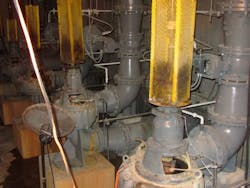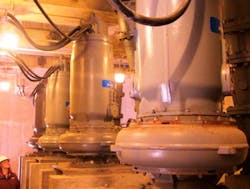Ypsilanti, Michigan is a city of 19,435 in Washtenaw County. Ypsilanti, or Ypsi as it is commonly referred, is six miles east of Ann Arbor, MI.
Project Background
Ypsilanti’s pumps, originally put into service in 1982, became priority candidates for replacement after operating ten years beyond their expected 20 year service life. The Ypsilanti Community Utilities Authority (YCUA), included the project in the utility’s Master Plan.
According to YCUA, it had become apparent during storm events that increased capacity would be critical for three of the four stations.
Given advancements in the pumps that YCUA preferred, the utility also had an opportunity to significantly improve the energy efficiency at the stations.
As a result, YCUA embarked on a $10 million pump replacement and capacity upgrade program involving four of the utility’s largest lift stations.
Solution
The four pump station retrofits, awarded as three separate contracts, required procurement of 18 Xylem Flygt N-pumps ranging from 100-HP to 470-HP.
Flygt N-pumps are uniquely engineered to cope with ‘modern trash’ now entering the nation’s wastewater streams. The reliability of an N-pump can be attributed to the semi-open, screw-shaped impeller that prevents clogging and facilitates the unobstructed flow of fibrous material. Without material wrapping around the impeller and sapping pump flow, RPMs and efficiency, energy savings have often exceeded 45 percent during field tests of the patented component while continuously maintaining the highest levels of efficiency throughout the life of the pump.
The leading edge of the N-pump’s rotating impeller passes across a stationary relief groove located in the pump suction port. The dynamic action cleans and pumps away any rags, stringy materials and solids from the impeller without compromising the hydraulic efficiency.
The engineering proves more reliable than even traditional chopper pumps that can grind rags and other debris but are less effective against hard foreign materials.
Result
At the conclusion of the replacements, three of the four stations experienced increased flow capacity. Additionally, one station, Snow Road, was awarded a rebate check from DTE Energy for over $65,000--more than what was requested-- due to energy efficiency achieved by the new Flygt N-pumps. The energy reduction equated to 40% less electric use than prior improvements.
YCUA executives cite another pumping station, Martz Road, where the new replacement pumps and VFDs have cut energy consumption from 2500 KWHs to just under 1600 KWHs daily in actual metered usage. This resulted in a 30% reduction in electrical consumption at this facility as well as the Willow Run Pump Station.
Meanwhile, Factory Street Pump Station, scheduled for replacement in 2014, will also receive the same five, 280-HP, 4350-GPM units that instill a new, maximum capacity of 25 MGD.
Editor's Note: Scranton Gillette Communications and the SGC Water Group are not liable for the accuracy, efficacy and validity of the claims made in this piece. The views expressed in this content do not reflect the position of the editorial teams of Water & Wastes Digest, Water Quality Products and Storm Water Solutions.

